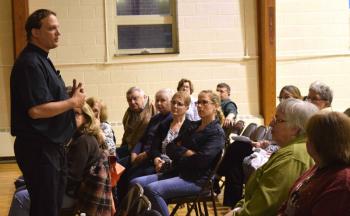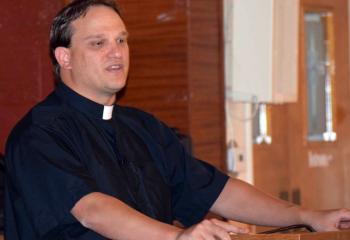By TARA CONNOLLY Staff writer
“It’s OK to defend the faith to people and lose people. It happened to Jesus. But don’t ever be afraid to speak the truth about the Eucharist and all aspects of the faith,” said Father Brian Miller, assistant pastor of St. Catharine of Siena, Reading, May 22 during “Apologetics Forum: The Catholic Faith Explained.”
Father Miller presented “Real Presence,” a term used in Christian theology to express the doctrine that Jesus is really or substantially present in the Eucharist, not merely symbolically or metaphorically.
He opened the discussion by explaining that the Catholic Church solemnly teaches that the Holy Eucharist is a sacrament instituted by Christ and his presence is effected by transubstantiation – a change in substance of bread and wine into the body and blood of Christ.
“He is wholly present both under the species of bread and the species of wine. When the sacred species of bread or wine are divided – Christ is wholly present in each part or division,” said Father Miller.
He also said “real presence” begins the instant the consecration is completed and is not restricted to the moment in which the Blessed Eucharist is being received.
“Real presence continues in the hosts and may be reserved after Holy Communion has been given. Christ in the Blessed Eucharist is to be worshipped with the supreme worship due to God himself,” said Father Miller.
In addition, he said, church teaching is derived from both natural law and divine revelation.
“In regard to the ‘real presence’ only divine revelation applies, the natural law does not.”
One also needs to believe that Jesus Christ is the second person of the trinity. He is the son of God who took on our human nature. Our beliefs in the real presence are based on his words,” said Father Miller.
He furthered his defense of “real presence” with several Scripture passages including John 6:35: “Jesus said to them, ‘I am the bread of life; he who comes to me shall not hunger, and he who believes in me shall never thirst.’”
“If you want a good defense of ‘real presence’ – read the Gospel of John,” he advised.
Father Miller also pointed out that the church encourages Catholics to receive frequent Communion, even daily Communion if possible, and mandates reception of the Eucharist only at least once a year – preferably during the Easter season.
“That doesn’t mean participating in the Mass once a year. As Catholics, we are to participate in the Mass every Sunday and holy days,” he said.
According to Father Miller, the early Jews and even some Catholics and non-Catholics contend that the Roman Catholic Church invented the doctrine of transubstantiation.
“The early church fathers and bishops never argued among each other because they all agreed that ‘real presence’ was not heresy or a problem. Both eastern and western churches were in agreement,” he said.
“It took 1,500 years for Martin Luther to argue against real presence. And he even recanted and accepted the belief.”
During the question and answer session of the evening, Father Miller fielded questions about whether a person in the state of grave sin can receive the Eucharist without seeking confession.
“There are remote areas in the world where a person may not have access to a priest to attend confession before receiving the sacrament. They can receive as long as they have it in their mind and heart to go to confession as soon as possible,” he said.
“That is not necessarily a problem in our diocese or country. Confession is usually available to us.”










